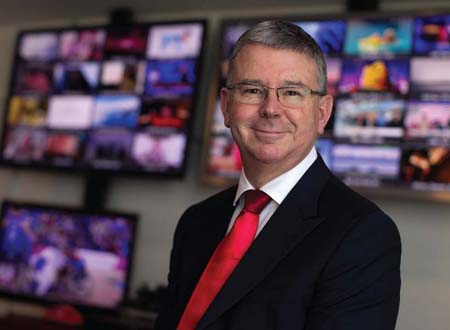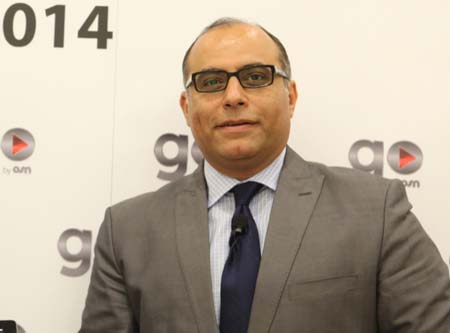In an interview with BroadcastPro ME, David Butorac, CEO of OSN, discusses the current pay TV scenario in the region and how OSN will maintain its premium position Do you think Netflixs entry into the region will have an impact on the MENA TV business? Netflix is a fantastic brand and has great positioning, particularly […]

In an interview with BroadcastPro ME, David Butorac, CEO of OSN, discusses the current pay TV scenario in the region and how OSN will maintain its premium position
Do you think Netflixs entry into the region will have an impact on the MENA TV business?
Netflix is a fantastic brand and has great positioning, particularly in the United States. I think there is a lack of understanding in the eyes of the consumer about what subscription VOD services like Netflix, Go and others in the marketplace here offer. What they dont offer is access to the premium, first-run content that we as a broadcaster deliver. These services serve as a good supplement to what you can watch on a premium platform like OSN.
Of course, in the OTT space, we expect to see some consolidation. There are a lot of OTT players in the market now, and they will struggle to survive. This is where organisations like ours that have relationships with key content providers will continue to thrive. We are already seeing a rapid acceleration on the take-up of Go and welcome competition, because when there is competition, the consumer is able to look at various products and identify which services aggregate the best content.
The battle will always be won by those that can aggregate the strongest content. Netflix is a strong player and well-funded in the US, and they continue to invest in regional productions, but even today their landmark productions like House of Cards are available only on OSN, because we have exclusive distribution deals on our linear service.
How do you view beINs entry into the entertainment space?
BeIN is not securing first-run premium content. If you look at the movies that are run on beIN, they are not trying to be in the premium space that OSN is in, because they dont have access to that content or they are in the second tier in the large part, after FTA. So if their business model is that they want to run second-tier content and charge lower rates for it, then thats the positioning they have chosen for themselves.
Our positioning has always been to provide first-run content. Just as the consumer may choose between driving a BMW and a lesser brand, they have to make similar choices in television, between watching premium content or second-run content.
What happens when those contracts are up for renewal?
Its always a competitive landscape. OSN has very strong and longstanding relationships with the studios, and as we recently announced, we have just renewed our NBCUniversal relationship for a significantly long period. We have extended our Discovery relationship and all of the premium Discovery channels are exclusively available on OSN.
There will be more announcements in the coming weeks that reinforce the long-term relationships between OSN and the content owners.
We have retained the relationships with those key studios and independent distributors, as is evidenced by the deals that we are announcing and have announced.
But you do not have premium football rights?
Thats right. We do not have premium football rights, but we do have other exclusive premium sports rights. We have access to all the cricket through our partnership with the ICC, all the golf and all WWE.
What I wont do is pay irrational sums of money for football rights, and thats what happens in this market. The return that is being generated to obtain football rights that are being acquired by the Qatari Sovereign for broadcasters is not commercially viable. They are paying exponential amounts of money for rights that never provide an ROI, and we are not prepared to do that.
I would love to have the premium football rights on our screens. When we did the landmark deal with Abu Dhabi Media to bring their sports channels to our platform ¬ despite ADM being very competitive with us when it comes to running their sports channel they have recognised that the consumer benefits from having all those services on one platform and the investment that OSN has made in creating what is unequivocally the most premium platform in the region. Its the same model across the world.
I dont mind competition, but we just wont pay silly money for rights, even if it means that the football rights are outside of our purview.
Two premium pay TV operators both have the muscle and money to go and bid for content. Will this lead to rising content costs?
Its always a delicate model, but pay TV works effectively in the way we manage the cost of content and increase the success of our business. We have very committed shareholders and now, we are in a position where we are running a profitable and successful business. In order to run a rational, economic model, we will always make certain that our costs dont accelerate beyond our ability to grow the business. We want to carefully manage the business; we dont want to make it so expensive that we cannot manage it.
Is the market large enough to support two pay-TV operators?
What we are seeing in every market and what we saw here prior to 2009 is the need for consolidation. The consumer has a very simple choice. If they want to watch football they may want beIN, but if they want premium entertainment they will subscribe to OSN.
These models have all happily co-existed for many years and will continue to do so. I wouldnt comment on the other entertainment services, because the rights that we have secured and the longevity of those rights means we have entertainment services that are not available elsewhere. But if people prefer second-tier services that were available previously on FTA and are now being packaged into a paid model, then thats the model that works for them. If they do want a premium model with first-run content, the consumer has one clear choice.
When pay-TV operators reduce their prices considerably, will this affect the FTA players?
The FTA market and pay market co-exist because the former is driven by ads and we are driven by subscriptions. We are not, in that respect, in competition with one another. Yes, the ad market is idiosyncratic and there is a large volume of free television, which is unusual, but thats because they distribute on satellite, which is also quite unusual globally. That also means we cant market our network on the basis of 150 channels. We have to market it on the premium nature of the channels, because the consumer already has over 800 channels. So it is not a volume play.
The FTA market and pay will happily co-exist.
We have to, however, also get real about advertising. The numbers thrown about as ad dollars in TV here are fictitious. The reality is that there is massive discounting on rates cards, and because there is no accurate reliable ratings system, the advertiser has no surety on where their ad dollars are being spent and therefore they are reluctant to spend it.
What this market needs across the board is accurate daily ratings that truly reflect TV audiences here and that will give the advertiser the comfort of knowledge in accuracy in numbers. Thats why I am a keen supporter, along with Rotana and other industry players, in the creation of the Saudi ratings system, which will become available later this year. Once we have that and the industry has a reliable currency, then you will see the advertising revenues increase in the region; but whilst you have this skewed model and vested interests in the advertising markets, who wish to stay as it is because perhaps it is not reflective of the audience, then the ad spend will remain low.
But that is an issue for free TV, because for pay TV our advertising revenue is minimal. As an industry leader, we believe that we must have an industry in this region that bears scrutiny to international standards.
Will production of Arabic content by the competition dampen the success of OSN Yahala?
We are very proud of OSN Yahala and have just launched OSN Yahala Cinema HD on Feb 1. It has been a huge success in terms of the movie content that we are offering premium HD, first-run Arabic movies. The more our industry is able to invest to grow, the stronger our industry becomes, so I welcome more entrants to that area.
We are not the biggest commissioner or licensee of Arabic language drama in this region, but what we aim to do is have a position of premium, so the consumer knows that premium content will always be available on OSN Yahala because it is the number one or two channel in key marketplaces like the UAE and Saudi Arabia. Arabic drama and Arabic content is vastly important. Were an Arabic market, and if there are more players investing in the creation of Arabic content, all that does is force the quality of the content up.
Would you be open to an acquisition?
Both our shareholders have previously stated they would like to take the company into the equity markets at some point, but we have no current plans for that at this moment. We are driving the business to grow its strengths. We have two very committed shareholders who are in no rush to get away, and they are very excited about the prospects for what is now a very successful business. So we will always look for the best ways to maximise the structure of the business but thats not a negative.
Its a positive, and ultimately the great accolade that we do take is the fact that so many people are interested in us because of the position we have created. Pay TV is on the road map now. Five years ago it wasnt, and we are very proud of the fact that we are the largest broadcaster in the region, and we love the fact that people are talking about us. It means people are taking us seriously.















































































